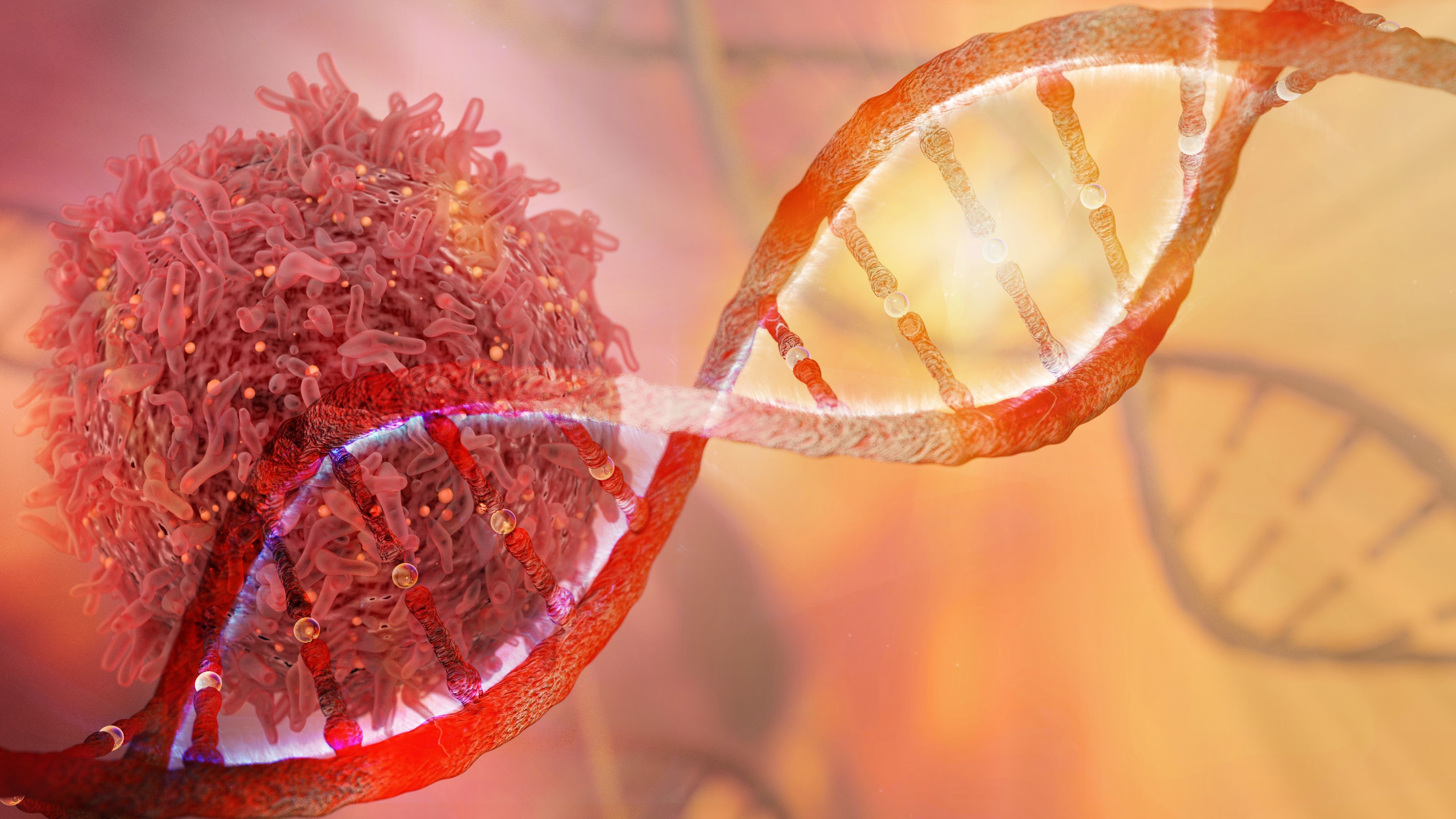Using SERS to Explore Cancer Cells with MTAP Deletions
A recent study from Spain used surface-enhanced Raman spectroscopy (SERS) to study cancer cells with methylthioadenosine phosphorylase (MTAP) deletions, shedding new insights into the metabolic interactions inside the tumor microenvironment that could influence cancer aggression.
Oncology, which is the study of cancer, is one of the largest healthcare disciplines. Understanding how cancer develops in the human body is paramount to improve human health and save lives. One of the main topics in oncology that researchers are exploring is cancer aggression, or how molecular changes in cancer cells and the tumor microenvironment (TME) can affect the aggressiveness of how cancer spreads in the human body.
DNA strand and Cancer Cell Oncology Research Concept 3D rendering | Image Credit: © catalin - stock.adobe.com

A recent study published in PNAS explores this very question. A team of researchers led by Arkaitz Carracedo and Luis M. Liz-Marzan from the Center for Cooperative Research in Biomaterials (CIC biomaGUNE) examined cancer cells with methylthioadenosine phosphorylase (MTAP) deletions using surface-enhanced Raman spectroscopy (SERS) to further understand the metabolic interactions that take place inside cancerous cells and the TME (1).
The TME is an important organ in cancer research because it often dictates how fast or slow the cancer spreads in the body. Using SERS, the research team discovered that cancer cells with MTAP deletions exude 5′-methylthioadenosine (MTA) (1). The production of MTA, coupled with fibroblasts that metabolize it, results in molecular changes that directly influence the progression of cancer, affecting the polarization of macrophage (1).
Several changes occur when MTA interacts with fibroblasts, which the authors describe in their study. First, the capacity of purine derivatives to induce macrophage polarization is impacted (1). Second, the molecular changes that occur accelerate the aggression of cancer, resulting in it spreading more quickly (1). Finally, the production cycle of purine derivatives is changed and can be recycled by cancerous cells (1).
Previous studies in this work focused on protein messengers. Traditional methods used for profiling metabolites in cells are limited (1). The use of SERS in deciphering metabolic interactions in multicellular systems has not been explored much, but because of the technique’s simple operation and nontargeted nature, it is optimal for application in metabolic research (1).
In this study, the researchers demonstrated in this study that SERS could be applied when analyzing secreted metabolites in the TME (1). By using SERS in this context, the hope is that it could innovate existing therapeutic strategies to improve them for future generations.
This article was written with the help of artificial intelligence and has been edited to ensure accuracy and clarity. You can read more about our policy for using AI here.
Reference
(1) Valera, P. S.; Plou, J.; Garcia, I.; et al. SERS analysis of cancer cell-secreted purines reveals a unique paracrine crosstalk in MTAP-deficient tumors. PNAS 2023, 120 (52), e2311674120. DOI: 10.1073/pnas.2311674120
AI-Powered SERS Spectroscopy Breakthrough Boosts Safety of Medicinal Food Products
April 16th 2025A new deep learning-enhanced spectroscopic platform—SERSome—developed by researchers in China and Finland, identifies medicinal and edible homologs (MEHs) with 98% accuracy. This innovation could revolutionize safety and quality control in the growing MEH market.
AI-Driven Raman Spectroscopy Paves the Way for Precision Cancer Immunotherapy
April 15th 2025Researchers are using AI-enabled Raman spectroscopy to enhance the development, administration, and response prediction of cancer immunotherapies. This innovative, label-free method provides detailed insights into tumor-immune microenvironments, aiming to optimize personalized immunotherapy and other treatment strategies and improve patient outcomes.
New AI-Powered Raman Spectroscopy Method Enables Rapid Drug Detection in Blood
February 10th 2025Scientists from China and Finland have developed an advanced method for detecting cardiovascular drugs in blood using surface-enhanced Raman spectroscopy (SERS) and artificial intelligence (AI). This innovative approach, which employs "molecular hooks" to selectively capture drug molecules, enables rapid and precise analysis, offering a potential advance for real-time clinical diagnostics.
Best of the Week: Chewing Gum with SERS, Soil Carbon Analysis, Lithium-Ion Battery Research
January 17th 2025Top articles published this week include a Q&A interview that discussed using surface-enhanced Raman spectroscopy (SERS) to investigate microplastics released from chewing gum and an article about Agilent’s Solutions Innovation Research Award (SIRA) winners.